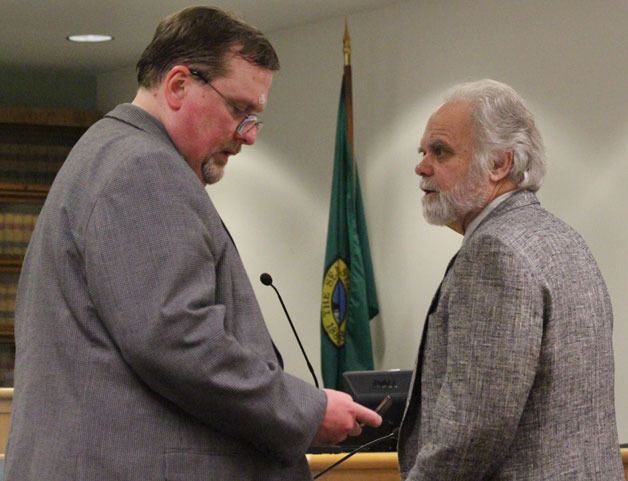A “secret obsession” with a female friend from Antarctica compelled Robert “Al” Baker to brutally murder his wife at their Greenbank home last summer, prosecutors claim.
Eric Ohme, the senior deputy prosecutor in Island County, laid out his case against Baker in opening statements at the start of the murder trial Thursday.
“The obsession he had for a woman that was not his wife,” Ohme told the jury. “It culminated the night of June 2 or the morning of June 3, 2012, when Robert Baker struck his wife in the head with a hammer, strangled her in their bed.”
Baker, 62, is facing a first-degree murder charge in the death of his wife, Kathie Baker. The couple met at an Antarctic science station and owned a well-known pizza restaurant in Freeland.
Baker is claiming innocence. His attorney, Tom Pacher, reserved his opening remarks until after the prosecution rests.
Ohme, however, spoke about the sheer violence of Kathie Baker’s death and described Baker’s alleged attempt to hide the body.
“He drug Kathie Baker’s body out of the house, through the garage,” Ohme said, “wrapped her body in a blue and silver tarp with ropes and bungee cords, and dumped her in a ravine behind the house.”
Ohme said Baker met Liza Schuldt, an Alaska resident, when they worked together in Antarctica. She felt their relationship was platonic, Ohme said, but Baker wanted more; he visited her twice, sent her romantic cards and then invited her to his home in Greenbank after falsely claiming he left his wife.
Ohme said Baker killed his wife and hid her body before Schuldt arrived.
Testimony Thursday focused on how investigators discovered Kathie Baker had been murdered, as well as the forensics of the crime scene — the Bakers’ home.
Deputy Leif Haugen with the Island County Sheriff’s Office took the stand and described how he started investigating Kathie Baker’s disappearance after receiving a welfare call from her employer. She was a computer programmer and worked long-distance for Denver-based Raytheon Corporation.
Both Haugen and Sgt. Laura Price, formerly a detective with the sheriff’s office, said they spoke with Baker and he claimed he had dropped his wife off at the airport days before. Haugen said he checked with the Port of Seattle and found no record of Kathie Baker’s departure.
Schuldt was with Baker at his home. Haugen said she thought that Kathie Baker no longer lived at the house and was surprised deputies were looking for her there.
Price said Baker showed the deputies around the house. She said they saw large brownish-red stains on the carpet in several different rooms and the stairs. She asked him about the stains.
“He told me the dogs poop on the carpet,” she said.
Price said the house was secured as a crime scene and both Baker and Schuldt were told to leave. A team of forensic scientists from the Washington State Patrol Crime Lab arrived the next day, June 9.
Mary Wilson, the lead forensic scientist, testified extensively Thursday. She described how her team found Kathie Baker’s tarp-wrapped body in a ravine behind the house, a trail of blood stains through the house and the alleged murder weapon in the garbage.
Wilson identified a long series of photographs she took at the scene, which Ohme showed to the jury on an overhead projector.
Wilson described finding massive blood stains on the carpet underneath two rug “runners” on the side of the bed in the master bedroom, as well as blood stains on the mattress pad, mattress and a night stand. She said the stains were “dilute,” which meant someone tried to clean them up.
She described following a trail of blood stains from the bedroom, across the living room, across the kitchen floor, down stairs and into the garage. A blood-stained comforter was in a basin in the washing-machine room and blood was found in the water of a carpet-cleaning machine, Wilson said.
According to Wilson, a member of her team found a hammer in the garbage; she collected hairs stuck to the striking surface.
Pacher cross-examined the witnesses briefly, pointing out that neighbors and alternate suspects weren’t interviewed and questioned the security of the crime scene.
There was no testimony on Friday due to a scheduling issue. The trial will resume Monday morning.



